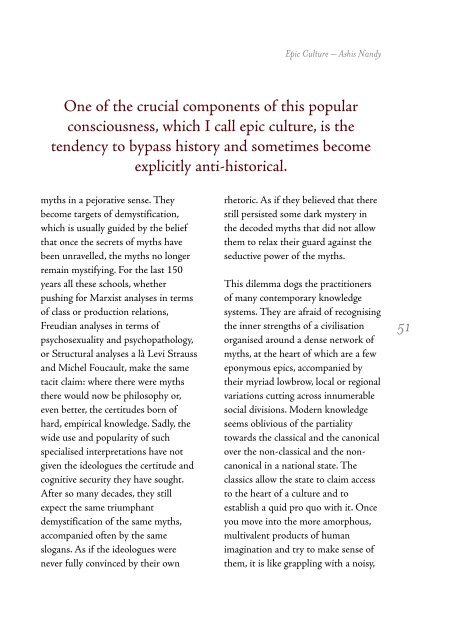Layout 3 - India Foundation for the Arts - IFA
Layout 3 - India Foundation for the Arts - IFA
Layout 3 - India Foundation for the Arts - IFA
Create successful ePaper yourself
Turn your PDF publications into a flip-book with our unique Google optimized e-Paper software.
Epic Culture – Ashis Nandy<br />
One of <strong>the</strong> crucial components of this popular<br />
consciousness, which I call epic culture, is <strong>the</strong><br />
tendency to bypass history and sometimes become<br />
explicitly anti-historical.<br />
myths in a pejorative sense. They<br />
become targets of demystification,<br />
which is usually guided by <strong>the</strong> belief<br />
that once <strong>the</strong> secrets of myths have<br />
been unravelled, <strong>the</strong> myths no longer<br />
remain mystifying. For <strong>the</strong> last 150<br />
years all <strong>the</strong>se schools, whe<strong>the</strong>r<br />
pushing <strong>for</strong> Marxist analyses in terms<br />
of class or production relations,<br />
Freudian analyses in terms of<br />
psychosexuality and psychopathology,<br />
or Structural analyses a là Levi Strauss<br />
and Michel Foucault, make <strong>the</strong> same<br />
tacit claim: where <strong>the</strong>re were myths<br />
<strong>the</strong>re would now be philosophy or,<br />
even better, <strong>the</strong> certitudes born of<br />
hard, empirical knowledge. Sadly, <strong>the</strong><br />
wide use and popularity of such<br />
specialised interpretations have not<br />
given <strong>the</strong> ideologues <strong>the</strong> certitude and<br />
cognitive security <strong>the</strong>y have sought.<br />
After so many decades, <strong>the</strong>y still<br />
expect <strong>the</strong> same triumphant<br />
demystification of <strong>the</strong> same myths,<br />
accompanied often by <strong>the</strong> same<br />
slogans. As if <strong>the</strong> ideologues were<br />
never fully convinced by <strong>the</strong>ir own<br />
rhetoric. As if <strong>the</strong>y believed that <strong>the</strong>re<br />
still persisted some dark mystery in<br />
<strong>the</strong> decoded myths that did not allow<br />
<strong>the</strong>m to relax <strong>the</strong>ir guard against <strong>the</strong><br />
seductive power of <strong>the</strong> myths.<br />
This dilemma dogs <strong>the</strong> practitioners<br />
of many contemporary knowledge<br />
systems. They are afraid of recognising<br />
<strong>the</strong> inner strengths of a civilisation<br />
organised around a dense network of<br />
myths, at <strong>the</strong> heart of which are a few<br />
eponymous epics, accompanied by<br />
<strong>the</strong>ir myriad lowbrow, local or regional<br />
variations cutting across innumerable<br />
social divisions. Modern knowledge<br />
seems oblivious of <strong>the</strong> partiality<br />
towards <strong>the</strong> classical and <strong>the</strong> canonical<br />
over <strong>the</strong> non-classical and <strong>the</strong> noncanonical<br />
in a national state. The<br />
classics allow <strong>the</strong> state to claim access<br />
to <strong>the</strong> heart of a culture and to<br />
establish a quid pro quo with it. Once<br />
you move into <strong>the</strong> more amorphous,<br />
multivalent products of human<br />
imagination and try to make sense of<br />
<strong>the</strong>m, it is like grappling with a noisy,<br />
51


